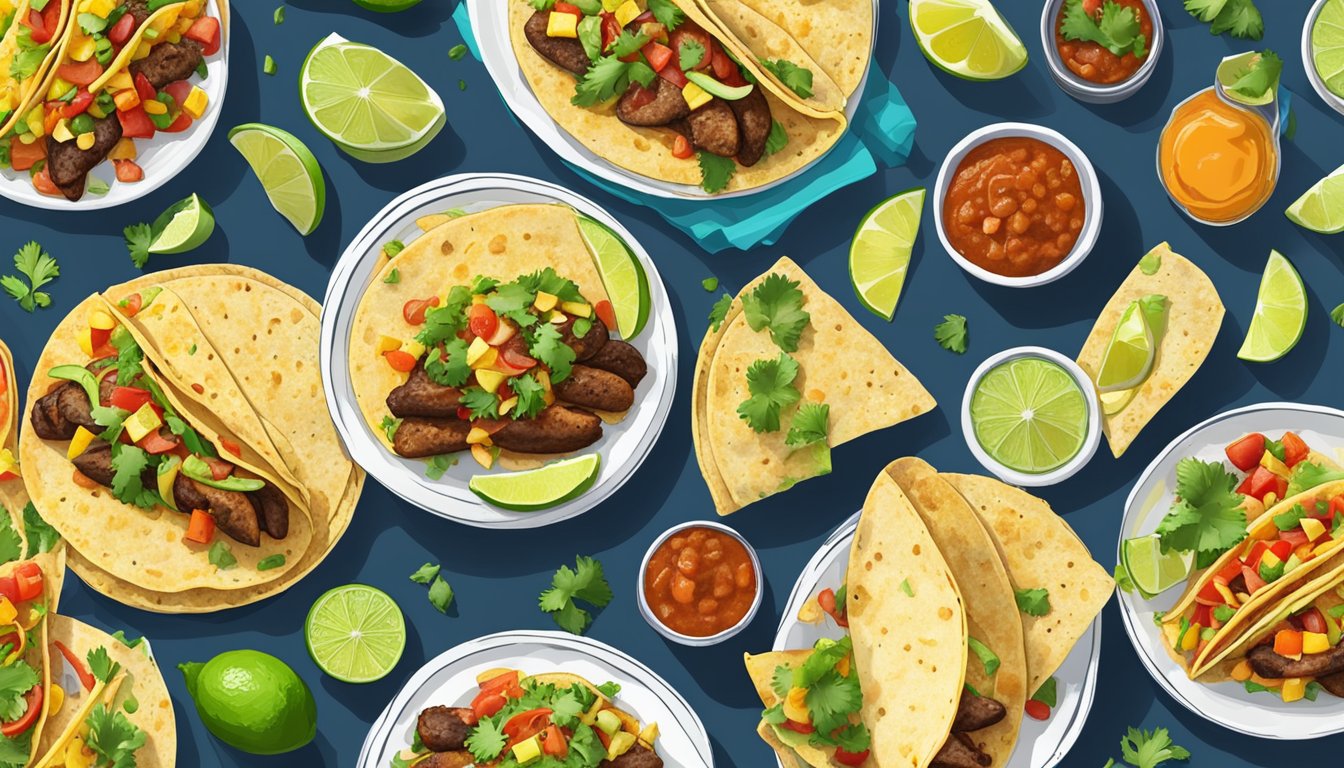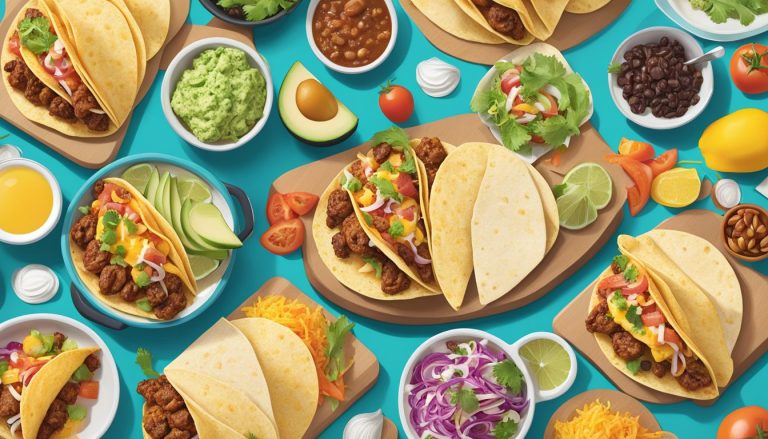Taco Cabana, a beloved Texan fast-food chain, offers two popular taco varieties that have captured the hearts and taste buds of many: breakfast tacos and street tacos. These culinary delights represent different aspects of Mexican-inspired cuisine, each with its own unique flavors and cultural significance.
Breakfast tacos at Taco Cabana showcase the chain’s commitment to morning comfort food. Taco Cabana’s breakfast tacos typically feature warm tortillas filled with classic ingredients like eggs, bacon, chorizo, potatoes, and beans, providing a hearty start to the day. The chain offers various combinations, including popular options like bacon and egg or bean and cheese tacos.
Street tacos, on the other hand, reflect the authentic Mexican street food experience. These smaller, palm-sized tacos are often served on soft corn tortillas and topped with simple yet flavorful ingredients like seasoned meats, cilantro, and onions. Taco Cabana’s street tacos draw inspiration from this tradition, offering options like mesquite-smoked brisket tacos that pay homage to Texas barbecue culture while embracing Mexican flavors.
Origins and Evolution
Tacos have deep roots in Mexican culinary traditions, evolving from simple street food to beloved culinary icons. This evolution has influenced both street tacos and restaurant chains like Taco Cabana.
History of Taco Cabana
Taco Cabana was founded in San Antonio, Texas in 1978. The chain aimed to bring authentic Mexican flavors to a fast-casual setting.
Their breakfast tacos became a signature item, blending Tex-Mex influences with traditional Mexican ingredients. Taco Cabana’s success stemmed from offering fresh, made-to-order tacos in a convenient format.
The company expanded rapidly across Texas and beyond, maintaining a focus on quality ingredients and authentic flavors. Taco Cabana’s breakfast tacos helped popularize the concept outside of traditional Mexican communities.
Street Tacos’ Roots and Traditions
Street tacos originated in Mexico as affordable, portable meals for workers. Vendors known as “taceros” sold these simple yet flavorful creations from carts and stands.
By the early 20th century, tacos had become a staple of Mexican street food culture. The variety of fillings and preparations reflected regional ingredients and tastes.
Street tacos gained prominence in the United States as Mexican immigrants introduced them to new communities. Cities like Los Angeles saw a proliferation of taco trucks and stands.
These authentic street tacos maintained traditional preparation methods and flavors, often using simple ingredients like corn tortillas, meat, onions, and cilantro.
Mexican Culture and Influence
Tacos hold significant cultural importance in Mexico, representing the country’s culinary heritage and regional diversity. Each region developed unique taco styles based on local ingredients and traditions.
The taco’s versatility allowed it to adapt to different tastes and preferences. This flexibility contributed to its widespread popularity both in Mexico and abroad.
UNESCO recognized traditional Mexican cuisine, including tacos, as an Intangible Cultural Heritage of Humanity in 2010. This designation highlighted the cultural significance of tacos and other Mexican dishes.
Mexican immigrants played a crucial role in introducing authentic taco flavors to the United States, influencing both street food and restaurant offerings.
Ingredients and Preparation
Breakfast tacos and street tacos differ in their key ingredients and preparation methods. The choice of tortillas, fillings, and cooking techniques contributes to their distinct flavors and textures.
Common Ingredients in Breakfast and Street Tacos
Breakfast tacos at Taco Cabana feature eggs as a primary ingredient, often combined with bacon, chorizo, potatoes, beans, or cheese. Street tacos typically focus on meat fillings like carne asada, al pastor, or chicken.
Both styles incorporate fresh toppings. Breakfast tacos may include salsa, cheese, and sometimes vegetables. Street tacos usually have simpler toppings like diced onions, cilantro, and lime wedges.
Salsas play a crucial role in both types. Breakfast tacos often come with red or green salsa, while street tacos may offer a variety of salsas, from mild to spicy.
Tortilla Types: Corn vs. Flour
Taco Cabana primarily uses flour tortillas for their breakfast tacos. These soft, pliable wraps hold up well to heavier breakfast ingredients and provide a neutral flavor.
Street tacos traditionally use corn tortillas. These smaller, sturdier tortillas offer a distinct corn flavor that complements the simple meat fillings. Corn tortillas are often double-stacked to prevent tearing.
Preparation methods differ as well. Taco Cabana likely warms their flour tortillas on a griddle. Street taco vendors often quickly dip corn tortillas in oil before heating on a flat-top grill, enhancing their texture and flavor.
Varieties and Flavors
Taco Cabana’s breakfast tacos and street tacos offer a diverse array of fillings, flavors, and toppings. From classic morning combinations to traditional Mexican street fare, these handheld delights cater to a wide range of tastes and preferences.
Classic Breakfast Taco Fillings
Breakfast tacos typically feature hearty, protein-rich ingredients. Eggs form the base of many popular combinations. Bacon and egg tacos provide a savory start to the day. Chorizo and egg tacos offer a spicy kick with Mexican sausage. Potato and egg tacos deliver a satisfying, starchy option.
Bean and cheese tacos are a vegetarian-friendly choice. Some variations include bean and egg tacos for added protein. Taco Cabana’s breakfast menu showcases these classic fillings in various combinations.
Breakfast taco boxes allow customers to mix and match their favorite fillings. This versatility makes breakfast tacos suitable for different dietary needs and preferences.
Popular Street Taco Variations
Street tacos boast a variety of traditional Mexican fillings. Carne asada tacos feature grilled beef steak, often seasoned with lime and spices. Al pastor tacos contain marinated pork cooked on a vertical spit, typically served with pineapple.
Carnitas tacos showcase tender, slow-cooked pork. Barbacoa tacos offer rich, braised beef or lamb. Chicken tacos provide a lighter meat option.
Street tacos are usually served on small corn tortillas. This allows diners to sample multiple flavors in one meal. The compact size also makes them easy to eat while standing or walking.
Salsas and Toppings
Both breakfast and street tacos benefit from an array of toppings and salsas. Fresh cilantro and diced onions are staple garnishes for street tacos. Pico de gallo adds a fresh, tangy element.
Guacamole provides creamy richness. Various salsas range from mild to fiery hot. Red and green salsas offer different flavor profiles.
Cheese is a common topping for both styles. Cotija, a crumbly Mexican cheese, is popular on street tacos. Shredded cheddar or jack cheese often tops breakfast tacos.
Lettuce and tomatoes are more commonly found on Americanized versions. Traditional street tacos typically stick to simpler toppings to highlight the meat’s flavor.
Culinary Experience
Taco Cabana’s breakfast tacos and authentic street tacos offer distinct culinary experiences. Each presents unique flavors, preparations, and atmospheres that cater to different tastes and occasions.
Breakfast Tacos at Taco Cabana
Taco Cabana’s breakfast tacos provide a convenient and satisfying morning meal. The Breakfast Taco Box offers variety, allowing customers to mix and match fillings like eggs, bacon, and chorizo.
The Cabana Sampler showcases an array of breakfast options, perfect for those who want to try multiple flavors. Taco Plates come with sides, creating a complete breakfast experience.
Taco Cabana’s casual atmosphere suits busy mornings or relaxed weekend brunches. The restaurant’s efficient service ensures a quick meal without compromising on taste.
Experiencing Authentic Street Tacos
Street tacos deliver a taste of genuine Mexican cuisine. These small, flavorful bites are typically served from food trucks or street-side stands, adding to their authenticity.
The experience of eating street tacos often involves standing at counters or finding nearby spots to enjoy the food. This casual, on-the-go style is part of their charm.
Street tacos usually feature simple yet bold flavors. Common ingredients include grilled meats, fresh cilantro, diced onions, and lime wedges. Salsas range from mild to fiery, allowing customization.
The street food atmosphere adds to the overall experience, with the sights, sounds, and smells of cooking enhancing the enjoyment of these delicious tacos.
Presentation and Portability
Taco Cabana’s breakfast tacos and street tacos differ significantly in their presentation and how easily they can be consumed on the go. These factors impact the overall dining experience and customer preferences.
Grab-and-Go Convenience
Taco Cabana’s breakfast tacos are designed for quick, convenient consumption. They come wrapped in foil or paper, making them easy to hold and eat while commuting or rushing to work.
The packaging keeps the tacos warm and prevents spillage. Customers can easily grab a bag containing multiple tacos, perfect for sharing or saving some for later.
Street tacos, in contrast, are typically served open-faced on small corn tortillas. They’re often presented on paper plates or wrapped in paper, emphasizing their street food origins.
While less tidy than Taco Cabana’s wrapped offerings, street tacos maintain their authentic presentation. This style allows for customization with various toppings and sauces at the point of sale.
Sit-Down Versus Street-Side Dining
Taco Cabana offers a fast-food restaurant environment for breakfast taco consumption. Patrons can enjoy their meals in air-conditioned comfort, seated at tables with proper utensils if desired.
This setting provides a more relaxed dining experience, suitable for meetings or leisurely breakfasts. Drive-thru and takeout options are also available for those preferring to eat elsewhere.
Street tacos are true to their name, often consumed standing at food trucks or street-side stalls. This casual, on-the-spot dining style is part of their appeal and cultural significance.
Eating street tacos becomes a social experience, with customers often gathering around the vendor. The immediacy of preparation and consumption adds to the freshness and authenticity of the meal.
Nutritional and Dietary Considerations

Taco Cabana’s breakfast and street tacos offer varied nutritional profiles. Calorie counts differ based on ingredients and preparation methods. The restaurant provides options for those with dietary restrictions.
Calorie Count and Healthier Options
Breakfast tacos at Taco Cabana range from 210 to 290 calories per serving. The Bean & Cheese Breakfast Taco is a lower-calorie option. Street tacos tend to have higher calorie counts, with beef street tacos containing 460 calories for a 3-taco serving.
Grilled options like chicken or steak fajita tacos are generally healthier than fried alternatives. A single chicken fajita taco contains 210 calories, while a steak fajita taco has 220 calories.
Adding vegetables to tacos can increase nutritional value without significantly impacting calorie content. Opting for soft tacos over fried shells also reduces calorie and fat intake.
Accommodating Dietary Restrictions
Taco Cabana offers options for various dietary needs. Vegetarian choices include bean and cheese tacos. For those avoiding dairy, tacos can be customized without cheese or sour cream.
Low-carb dieters can opt for fajita meat and vegetables without the tortilla. Gluten-sensitive individuals should be cautious, as most tortillas contain gluten.
Sodium content is a concern in many menu items. The chicken fajita taco contains 850mg of sodium, while the steak version has 790mg. Those watching their sodium intake should be mindful of portion sizes and frequency of consumption.
Cultural and Commercial Impact
Tacos have profoundly shaped culinary landscapes and business models in Texas and beyond. Their influence extends from local fast-food chains to international street food scenes.
Taco Cabana’s Influence in Texas
Taco Cabana has become a Tex-Mex institution in Texas since its founding in 1978. The chain’s breakfast tacos have ingrained themselves in Texan food culture, offering a quick and satisfying morning meal option. Taco Cabana’s success has inspired other regional fast-food chains to incorporate breakfast tacos into their menus.
The company’s growth has created job opportunities across Texas and neighboring states. Its 24-hour service model caters to late-night diners and early risers alike, filling a unique niche in the fast-food market.
Taco Cabana’s menu reflects the fusion of Mexican and American tastes, exemplifying the evolution of Tex-Mex cuisine. This blend has influenced local palates and contributed to the broader acceptance of Mexican-inspired flavors in American fast food.
Street Tacos and Their Global Reach
Street tacos have transcended their Mexican origins to become a global culinary phenomenon. Food trucks and pop-up stands in cities worldwide now serve these handheld delights, introducing diverse populations to authentic Mexican flavors.
The popularity of street tacos has sparked a trend of gourmet taco restaurants. These establishments often combine traditional Mexican ingredients with local and international flavors, creating innovative fusion dishes.
Street tacos’ simplicity and customization options have made them a favorite for food entrepreneurs. The low startup costs associated with taco trucks have enabled many small business owners to enter the food industry.
Social media has played a crucial role in spreading street taco culture. Instagram-worthy taco presentations and food bloggers’ recommendations have fueled interest in seeking out authentic taco experiences.
Consumer Preferences and Trends

Taco preferences vary widely among consumers, with breakfast tacos and street tacos each commanding loyal followings. Regional tastes and individual preferences play key roles in shaping taco consumption habits across different meal times.
Popularity of Breakfast Tacos
Breakfast tacos have surged in popularity, especially in regions like Texas. Taco Cabana’s Half-Dozen Breakfast Taco Box, priced at $9.99, reflects this trend. It includes popular varieties such as Bacon & Egg, Bean & Cheese, Chorizo & Egg, and Potato & Egg.
Many consumers appreciate the convenience and portability of breakfast tacos. They offer a hearty start to the day, combining familiar breakfast ingredients in an easy-to-eat format.
The versatility of breakfast tacos also appeals to those seeking customization. Diners can often mix and match fillings to suit their tastes.
Lunch and Dinner Street Taco Favorites
Street tacos have gained traction as a lunchtime and dinner option. These smaller, more authentic tacos typically feature simple ingredients on corn tortillas.
Popular street taco fillings include:
- Carne asada (grilled beef)
- Al pastor (marinated pork)
- Pollo (chicken)
- Pescado (fish)
The compact size of street tacos allows consumers to try multiple varieties in one sitting. This appeals to those who enjoy variety in their meals.
Street tacos’ perceived authenticity resonates with diners seeking traditional flavors. The charred tortillas and simple, fresh ingredients offer a different experience from Americanized tacos.
Pricing and Value
Taco Cabana offers competitive pricing for both breakfast tacos and street tacos. The menu includes various combos and box options that provide value for customers looking to purchase multiple tacos.
Cost Comparison
Breakfast tacos at Taco Cabana are generally priced lower than street tacos. A single breakfast taco costs $1.09, while a combo with multiple tacos is $3.39. Street tacos are slightly pricier, with a 3-pack costing $4.49.
For those seeking larger quantities, Taco Cabana offers taco boxes. A dozen breakfast tacos range from $15.99 to $39.99, depending on the filling. This option provides savings compared to purchasing individual tacos.
Size and Quantity
Breakfast tacos tend to be more substantial in size compared to street tacos. Street tacos are typically smaller, designed as mini tacos for a lighter meal or snack.
A street taco plate, priced at $6.89, includes multiple tacos along with sides. This offers a more filling option for those who prefer street tacos. Regular tacos and fish tacos are also available, with pricing that falls between breakfast and street tacos.
Combos for both breakfast and street tacos often include additional items like chips, queso, and drinks, enhancing the overall value for customers.
Taco Cabana’s Menu Beyond Tacos

Taco Cabana offers a diverse menu extending well beyond their signature tacos. The restaurant features an array of complementary dishes and sides, as well as a selection of beverages to round out the dining experience.
Complementary Offerings and Sides
Burritos and quesadillas provide hearty alternatives to tacos. The Cabana Bowl offers a customizable option for those seeking a knife-and-fork meal. Nachos serve as a popular shareable appetizer or snack.
Flautas, crispy rolled tacos, come in chicken varieties. Fajitas bring sizzling meats and vegetables to the table. Bean and rice sides accompany many dishes.
For breakfast, Taco Cabana offers convenient Breakfast Taco Boxes with assorted fillings like potato, egg, and cheese or chorizo and bean.
Beverage Selection
Taco Cabana’s drink menu features both non-alcoholic and alcoholic options. Soft drinks and iced tea are available in 20 oz servings.
Coffee pairs well with breakfast items. For those seeking an adult beverage, margaritas are a menu highlight.
Combo meals often include a 20 oz drink at a discounted price when purchased with food items. This allows customers to enjoy a complete meal with a beverage for added value.




